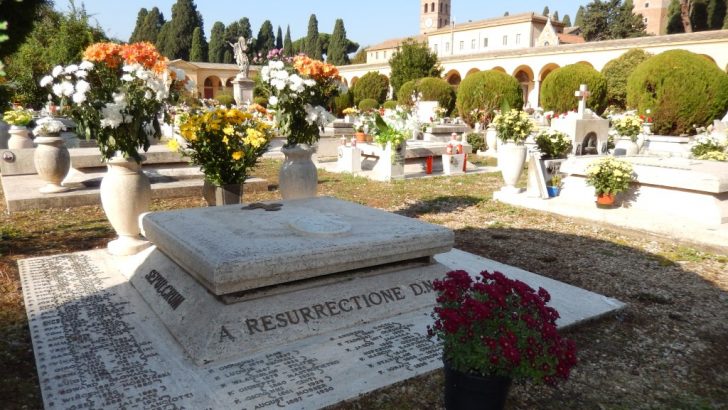Notebook
Fr Bernard Healy
The approach of November in Rome is usually marked by additional bus services to the city’s cemeteries. Although religious practice rates in Rome are probably no more encouraging than in Ireland, the custom of the cemetery visit during November is still strong.
The community of the Pontifical Irish College prays for past staff, students and friends of the College buried in its vault at the Campo Verano cemetery [pictured]every November. In addition to the College vault there are a number of other graves and tombs that I visit each year. One of them is the Jesuit tomb where a number of my former professors have been laid to rest. A friend once observed that reading the names on the grave niches was like wandering through a library with all these theologians stacked on top of each other like so many piles of books.
Control
The cemetery itself has an interesting history. Traditionally Roman burials happened in the vaults of the many city churches. However, between 1808 and 1814, Rome fell under the control of Napoleon Bonaparte as French armies overran the Papal States. One of the reforms the French insisted upon was the construction of a monumental cemetery outside the city walls. The policy was partially aimed at public health and partly about secularising the process of burial.
Notwithstanding this, when Rome returned to Papal government, the cemetery was retained and it was eventually consecrated in 1835, with both the Papal and the Italian governments expanding and developing it over the coming decades.
As with everything in Rome, there is a connection to the distant past. The cemetery is located next to the ancient Basilica of St Laurence-outside-the-Walls, with its catacombs dating to the early Christian era. Both the Basilica and the Verano cemetery were damaged in July 1943 during the first significant allied bombing of the city. That bombing was aimed at nearby railway lines, but led to thousands of civilian casualties.
Consolation
Ignoring the usual protocol for leaving the Vatican, the normally remote Pope Pius XII rushed to the area afterwards to personally console the people and distribute alms.
The Roman people did not miss the fact that the Pope was closer to them than Mussolini or the Italian King.
The Pope discovered that his own family’s grave was destroyed in the bombing too. When he returned to the Vatican, his housekeeper observed that he had bloodied his white cassock. “That’s not my blood,” he replied, “that is the blood of Rome.”
***
A grave I always visit in the Campo Verano is that of an Irishman, Bartholomew ‘Bartle’ Teeling, who died in Rome in 1921 as a ‘Papal Chamberlain’, an honour given to him by the Pope for his service to the Church in various capacities. Born in Kells in 1848, he was amongst those Irishmen who fought for the Pope prior to the Fall of Rome in 1870 when the last remains of the Papal States were captured by the troops of the Italian King Victor Emmanuel II. Even though the Church may have benefited from the Popes losing their temporal power, next year’s 150th anniversary of this event would be a good time to remember those Catholics from Ireland who did their bit on the battlefield in defence of the Pope and his interests.
***
One of the first phrases I learned in Italian almost 20 years ago was “in bocca al lupo!” It’s how you wish someone good luck before an exam and means “in the mouth of the wolf!” The traditional response, “crepi!”, “May the wolf die!” explains the meaning of the phrase.
The idea is of a dangerous situation like a hunter confronting the jaws of a ravenous wolf, and we hope the wolf dies. However, Italian friends tell me that it’s now fashionable to reply “viva il lupo!”, “Long live the wolf!”. It’s no longer acceptable to wish the death of a wolf.
Whilst it’s good that we have a greater ecological sensibility, I can’t help but think the Italian language is losing out. Just as the language of scripture is full of military images so as to remind us that the Christian life is a genuine spiritual battle, the older version of the phrase does better justice to the challenges life throws at us and our desire to overcome them.


 Campo Verano Cemetery
Photo: The Congregation of the Resurrection
Campo Verano Cemetery
Photo: The Congregation of the Resurrection 